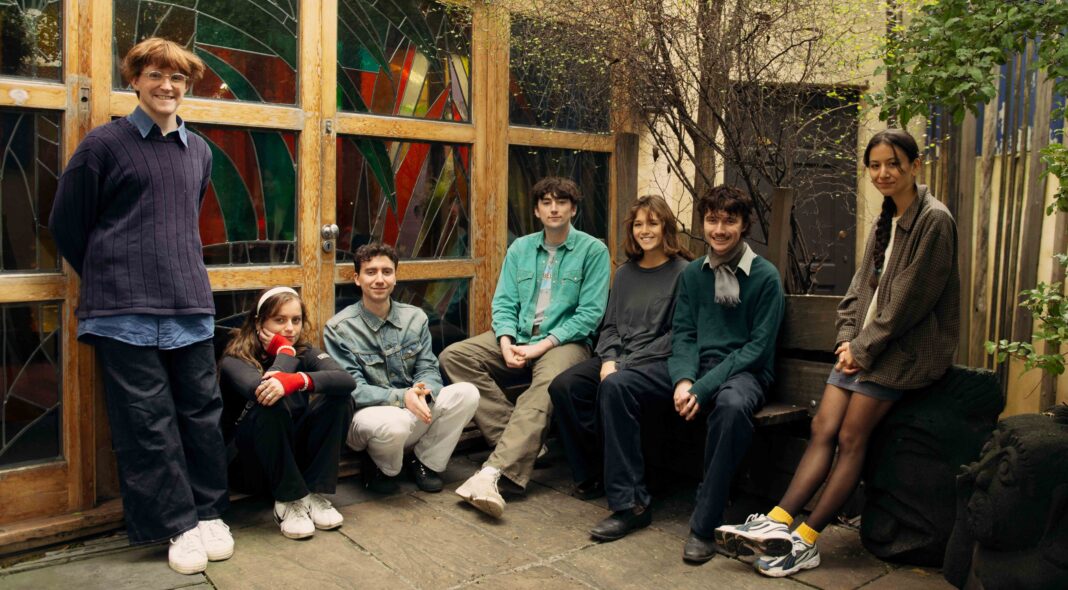‘For the first time’ is not a considered, conceptual album, say Black Country, New Road, but “a true document of what we were doing in our first year” – or as they put it in the final track, “what we built from black country ground”. Clever trick. To describe their debut as a record of everything that’s happened so far clears a future path, and side-steps the conundrum facing a band saddled with hype: how to fulfil expectations – and escape preconceptions.
Two years of build-up have simplified Black Country, New Road down to their basic parts: an ambitious septet spawned from the same Brixton Windmill scene as Squid and black midi, musically eclectic and adept, with a live reputation that’s half spoken-word night, half “eastern Mediterranean rave”. The pretentiousness potential is high. Among the seven middle-class Cambridge kids are several Guildhall alumni, the daughter of Underworld’s Karl Hyde, and a songwriter who reads Thomas Pynchon, David Foster Wallace, and Maggie Nelson. An early solo track by said songwriter, Isaac Woods, reads like the opening of an EM Forster novel: “This is the story of one Cambridge boy, who, despite all his privileges, felt betrayed by the world.”
But Black Country, New Road try to make good use of use all their privileges. Woods’ writing holds up a mirror to the band’s own tribe, young in a fucked-up world: bad sex, a non-ironic love of pop culture, a pervading sense of disconnect. Add to that the band’s mixed musical background – from classical to klezmer to DIY, with a gear list that would make any tour manager sweat – and the level of anticipation riding on just two songs begins to make sense.
Those two songs – ‘Athen’s, France’ and ‘Sunglasses’ – were re-recorded to fit the rest of the album, produced by Andy Savours, whose work with bands like My Bloody Valentine, The Killers, and Sigur Ros, suggests he knows a thing or two about epics. For five of the six tracks on ‘For the first time’ stretch beyond six minutes – yet every second feels considered, necessary. A constant tension saves the songs from souring. The instrumental opener moves like a klezmer jam sound-tracking a Cold War movie, and most of the tracks, like all good thrillers, play with structure and tempo. On ‘Science Fair’, just as guitar, sax, and violin reach an unbearable screech, the whole thing drops back into fifties espionage.
The exception is ‘Track X’. Instrumentally prettier and more precise, with fresh, delicate harmonies, it’s the shortest song, and full of promise. The track wisely steps away from the sometimes-irritating ‘sprechgesang’ (‘spoken singing’) Black Country, New Road risk being typecast with, that fuels the dark satire of the other songs. For Woods lampoons modern middle-class life with relish. Breakfast islands, Nutribullets, and “six-part Danish crime dramas” come under fire, as does phony internet culture: “It’s a one size fits all hardcore cyber fetish early noughties zine / She sells matcha shots to pay for printing costs and a PR team.” His narrative songwriting could generate endless essays on literary technique, but his removal of the boundary between highbrow and lowbrow is more interesting, mixing Bedales with Shellac and Kanye West.
It’s similarly impossible to lasso together the band’s musical influences. Just think: absolutely everything. Along with classical pieces and Travis Scott, they know all the words to Bruce Springsteen’s ‘Jungleland’ and reference ‘Thunder Road’, while Scott Walker, black midi, and Richard Hell also get mentions. Sonically, these extensive tastes don’t come across – but it’s early days.
It would be very easy to dismiss Black Country, New Road as a wanky student poetry band. Their instrumentals are as hard to pin down as Bob Dylan lyrics – and their lyrics are like if TS Eliot appeared on Peep Show. Yet it’s equally easy to read the band as a celebration of the richness of culture beyond British borders, and an argument for the provision of affordable music education and resources for young people. What’s certain is that Black Country, New Road are smart: upfront about who they are and, as their name suggests, determined to keep moving, before the male math-rock microcosm collapses. As goes the album’s final line: “what we built must fall to the rising flames”.


